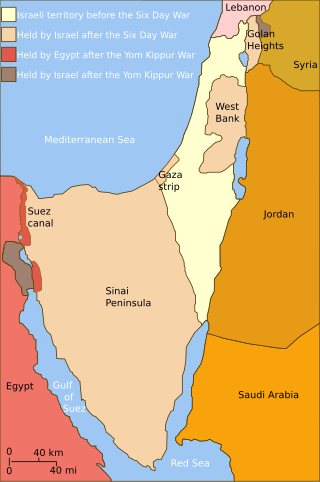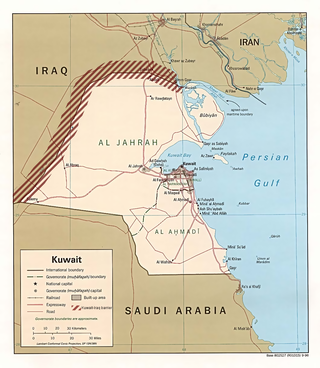
The United Nations Security Council (UNSC) is one of the six principal organs of the United Nations (UN) and is charged with ensuring international peace and security, recommending the admission of new UN members to the General Assembly, and approving any changes to the UN Charter. Its powers as outlined in the United Nations Charter include establishing peacekeeping operations, enacting international sanctions, and authorizing military action. The UNSC is the only UN body with authority to issue resolutions that are binding on member states.

The member states of the United Nations comprise 193 sovereign states. The United Nations (UN) is the world's largest intergovernmental organization. All members have equal representation in the UN General Assembly.

A United Nations Security Council resolution (UNSCR) is a United Nations resolution adopted by the Security Council (UNSC), the United Nations (UN) 15-member body charged with "primary responsibility for the maintenance of international peace and security".
A United Nations General Assembly resolution is a decision or declaration voted on by all member states of the United Nations in the General Assembly.
China is one of the members of the United Nations and is one of five permanent members of its Security Council. One of the victorious Allies of World War II, the Republic of China (ROC) joined the UN as one of its founding member countries in 1945. The subsequent resumption of the Chinese Civil War between the government of Republic of China and the rebel forces of the Chinese Communist Party, led to the latter's victory on the mainland and the establishment of the People's Republic of China (PRC) in 1949. Nearly all of mainland China was soon under its control and the ROC government retreated to the island of Taiwan.

A United Nations resolution is a formal text adopted by a United Nations (UN) body. Although any UN body can issue resolutions, in practice most resolutions are issued by the Security Council or the General Assembly, in the form of United Nations Security Council resolutions and United Nations General Assembly resolutions, respectively.

United Nations Security Council Resolution 338 was a three-line resolution adopted by the UN Security Council on 22 October 1973, which called for a ceasefire in the Yom Kippur War in accordance with a joint proposal by the United States and the Soviet Union. It was passed at the 1747th Security Council meeting by 14 votes to none, with China abstaining.

United Nations Security Council Resolution 339 was adopted on 23 October 1973 in order to bring a ceasefire in the Yom Kippur War where Resolution 338 two days before had failed.

United Nations Security Council Resolution 350, adopted on 31 May 1974, established the United Nations Disengagement Observer Force, to monitor the ceasefire between Israel and Syria in the wake of the Yom Kippur War. UNDOF was initially established for a period of six months, but has had its mandate renewed by subsequent resolutions.
Chapter VI of the United Nations Charter deals with peaceful settlement of disputes. It requires countries with disputes that could lead to war to first of all try to seek solutions through peaceful methods such as "negotiation, enquiry, mediation, conciliation, arbitration, judicial settlement, resort to regional agencies or arrangements, or other peaceful means of their own choice." If these methods of alternative dispute resolution fail, then they must refer it to the UN Security Council. Under Article 35, any country is allowed to bring a dispute to the attention of the UN Security Council or the General Assembly. This chapter authorizes the Security Council to issue recommendations but does not give it power to make binding resolutions; those provisions are contained in Chapter VII. Chapter VI is analogous to Articles 13-15 of the Covenant of the League of Nations which provide for arbitration and for submission of matters to the Council that are not submitted to arbitration. United Nations Security Council Resolution 47 and United Nations Security Council Resolution 242 are two examples of Chapter VI resolutions which remain unimplemented.

United Nations Security Council resolution 773, adopted on 26 August 1992, after recalling resolutions 687 (1991) and 689 (1991), the Council considered the work of the Iraq–Kuwait Boundary Demarcation Commission established on 2 May 1991, and reiterated its position that it would enforce any violation of the ceasefire in the demilitarised zone.

United Nations Security Council resolution 806, adopted unanimously on 5 February 1993, after recalling resolutions 687 (1991), 689 (1991) and 773 (1992) in addition to a report by the Secretary-General Boutros Boutros-Ghali, the council, acting under Chapter VII of the United Nations Charter, guaranteed the inviolability of the international boundary between Iraq and Kuwait measures taken to enforce it, in the aftermath of Iraqi incursions into the demilitarised zone in January 1993.

The 2012 United Nations Security Council election was held on 18 October 2012 during the 67th session of the United Nations General Assembly, held at the Headquarters of the United Nations in New York City. The elections were for five non-permanent seats on the UN Security Council for two-year mandates commencing on 1 January 2013 to replace the five countries whose terms expired. The countries elected were Argentina, Australia, Luxembourg, the Republic of Korea, and Rwanda with Luxembourg being elected for the first time.

United Nations Security Council resolution 1522, adopted unanimously on 15 January 2004, after recalling all previous resolutions on the situation in the Democratic Republic of the Congo, the council welcomed efforts to establish the first integrated and unified brigade in Kisangani as a step towards forming a national army. It was the first Security Council resolution adopted in 2004.

The 2004 United Nations Security Council election was held on 15 October 2004 at United Nations Headquarters in New York City during the 59th session of the United Nations General Assembly. The General Assembly elected five non-permanent members of the UN Security Council for two-year terms commencing on 1 January 2005.
The Bangladesh Liberation War was a revolutionary war of independence that took place in South Asia in 1971; it resulted in the establishment of the republic of Bangladesh. The war pitted East Pakistan against West Pakistan and lasted nine months. It witnessed large-scale atrocities, the exodus of 10 million refugees and the indiscriminate killing of 100,000 to 300,000 people from both sides.

United Nations Security Council resolutions are United Nations resolutions adopted by the fifteen members of the Security Council (UNSC); the United Nations (UN) body charged with "primary responsibility for the maintenance of international peace and security".









